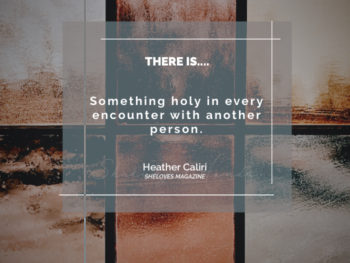
The moment I realized I’d been abused, I was staring at my computer screen.
I’d been working on a book about reading the Bible without anxiety, and decided to include scenes from my high school youth group, at the church I still attend.
There, I’d made amazing friends, had my first heady experiences of fellowship, the Bible, and evangelism.
All positive. Except for a gigantic caveat.
In college, I learned my youth pastor had sexually assaulted my best friend for much of high school.
Now as I typed, I held the good and bad in my mind, and tried to write down the middle. Only my memory wasn’t cooperating.
Instead of earnest spirituality, or teenage high jinks, all I could write was darkness. I remembered my pastor speaking poorly of other adults. Asking me to “pray” for the students who didn’t curry his favor or show up to every event. I recalled his weird involvement in my dating life and extracurricular activities, and the moment I thought he was going to kiss me while I shared a prayer request with him.
I’d known he was abusive. I just never recognized that he’d abused me, too.
He spiritually abused me.
In his book, Healing Spiritual Abuse, author Ken Blue explains, “Spiritual abuse happens when a leader with spiritual authority uses that authority to coerce, control or exploit a follower, thus causing spiritual wounds.”
There at my desk, I finally understood how my friend’s abuse was possible. How our pastor isolated us from healthy adults, punished those who didn’t conform, and broke down physical and emotional boundaries.
For the first time, I also understood my wounds: the anxiety I felt about spiritual practices. The strange cynicism I felt about pastors. My recent desire to stay as far away from church services as possible.
Maybe I wasn’t a backslider. Maybe I was grieving.
I felt sick as I wrote out my memories, but looking back, it was as if God handed me a key—a chance to be free from shame, darkness, and my youth leader’s authority.
Instead of feeling ashamed of the negative feelings that have plagued my spiritual walk, I’m starting to understand them as remnants of mistreatment. As I’ve learned to be gentle with my spirit, I’ve begun to heal.
Here’s how:
I processed the past
Over the years I’d thought I understood what happened in youth group. But not until I started writing down specific scenes and details did I see its abusive culture.
Writing allowed me to remember youth group with the wisdom of an adult. Many of the memories I glossed over for years seemed normal when I was a teenager. But as an adult with kids of my own, I recognized the twisted logic of my pastor.
I needed to go back in order to move forward.
I found my voice.
Once I understood what happened to me, I felt urgency about telling my story to others. Sometimes, that was private: telling my husband, prayer partner, and my sister.
But it was also more public. I made appointments with safe leaders at my church to talk about their handling of the past, and their experience of it. I started ading the subject on my blog and elsewhere.
Seeing my husband react to my story helped validate my anger and drew us closer together. Looking my senior pastor in the eye as he listened humbly to my anger and grief helped me start healing cynicism towards church.
Sharing my story is tremendously empowering.
I gave myself permission.
My youth leader pressured us to make the group our life, and shamed us when we didn’t comply.
Part of my healing has been giving myself permission to not be involved in my church.
I’ve stepped down from leadership positions, and stopped going to church every Sunday. I tend to tune out sermons, and I don’t volunteer in Sunday school.
Saying no to constant involvement feels good.
I’ll be honest—giving myself permission to step down has been hard. I’ve gotten some pushback from a well-intentioned friend, and felt embarrassed that my kid’s Sunday school teachers can’t count on my help.
It’s worth it.
On the Sundays my husband takes my kids to church without me, I take long walks on the beach near my house. Once I recited a Psalm about the power of God as water slipped over my feet. With every gentle wave, I felt my youth pastor’s lies lose their grip on my spirit.
I expanded my definition of spiritual disciplines.
For a long time, reading the Bible, prayer, or quiet times all caused me anxiety. I thought that those were the Right Ways to connect to God, and so I kept after them–even when they made me despair. Just like in youth group, I felt pressure to show up.
But now I’ve radically expanded my definition of spiritual practices.
I started deconstructing a Bible in a wild art experiment. I started thinking of questions and spiritual writing as forms of prayer. And when I abstained from spiritual activities that made me anxious, I realized it was a kind of fast.
I still seek out traditional disciplines, like liturgy, a prayer partner, and a women’s small group. But I feel freedom in choosing to encounter God with creativity and joy instead of a heavy sense of obligation. I know now that He isn’t trying to control me like my youth pastor did.
There’s no right way to recover from spiritual abuse. But the more I listen to what my heart is crying out for, the more I’m able to reconnect to God. My youth pastor trained me to mistrust others—and myself. He trained me to tap-dance to earn approval. But now, God is empowering me to heal, and dance in wild freedom before His throne.















I read your post on Relevant and it really resonated with me. I’ve gone through a similar situation in the way it affected me, but different in how it happened. Only in the last 2 months have I been able to read my Bible again without getting anxiety. This is the first post I’ve ever read where someone actually seemed to understand how hard it is to still want to be a Christian and pursue your faith after being spiritually abused. I still haven’t returned to church. I want to but I can’t right now. Do you have any more posts about this topic?
Thank you so, so, so much for your post. You have no idea.
You’re so very welcome, Cristabelle. I’m really, really sorry that you went through this. I’m with you there, in the trenches, and hope you feel more and more encouraged.
Here are a few suggestions. I feel like I’ve written about this a lot at SheLoves Magazine, so all these suggestions are from there:
On (not) doing devotions: http://shelovesmagazine.com/2014/wings-devotion-2/
On (not) reading the Bible: http://shelovesmagazine.com/2014/bible-shredded-heart/
Me figuring out I was abused: There’s Power In Naming the Truth
Me not going to church: http://shelovesmagazine.com/2013/depths-came-joy/
And me worried about losing my faith: http://shelovesmagazine.com/2013/when-i-lose-my-way-jesus-finds-me/
You’re not alone, and it is okay to feel whatever you are feeling right now. It’s (heck yeah!) more than okay to not want to go to church. (and if you want to stop reading your Bible again, that’s okay too. I seem to vacillate 😉
much love.
Wow, thank you so much! I’m going to check those out. I really appreciate you getting back to me. I shared your article on my FB page and with some others who went through similar abuse I did. So I really appreciate it. Thank you for being able to put into words feelings that those of us who have been spiritually abused aren’t able to at the time!
You’re welcome! I stumbled along blind to the abuse I went through for almost 20 years–it hamstrung my faith and I blamed myself. If I can spare anyone even one minute of thinking it’s they’re fault they feel sick about the Bible/church I will be SUPER happy.
“Maybe I want a backslider. Maybe I was grieving…” Yes. Yes, so, so much.
Spiritual abuse… I’m going to begin writing publicly about this later this month, and it’s terrifying, but good. Mine came first from my father, then from my mother, and then from members of the faith community. I think those who would abuse this way often sense when someone has already been exploited, and is vulnerable to more.
Thank you for writing this. (And congratulations on being published by Relavent!)
I’m so sorry you experienced abuse, too, Alena. It’s so crappy, and so wrong.
Yet I’m so happy to have you here, so happy that we can walk this road together. Send me the link to your posts when they’re up, okay? And absolutely, predators go after the weakest church goers. The same people get targeted over and over. It’s horrifying.